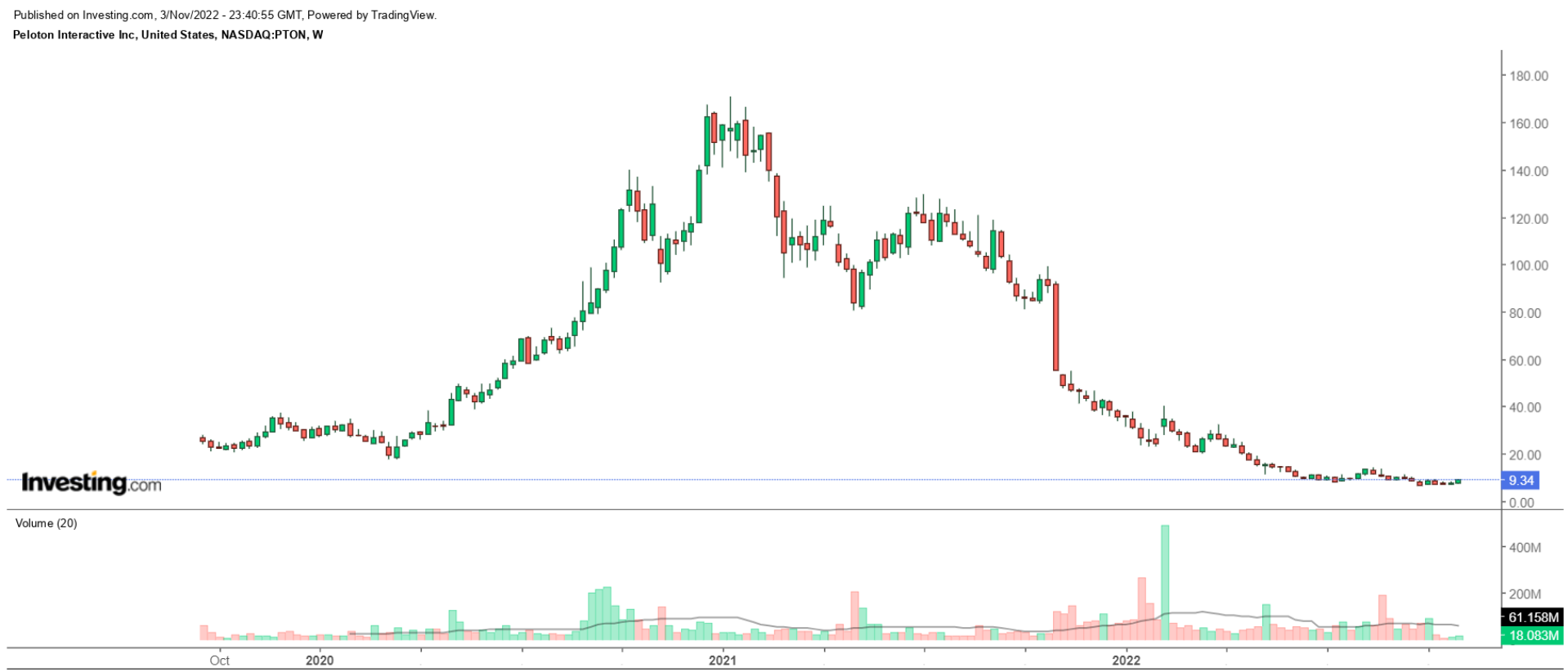- Peloton is down 73.9% year-to-date and 94.5% from its January 2021 record high
- Expect more pain ahead for the embattled company.
"The ship is turning," Peloton (NASDAQ:PTON) CEO Barry McCarthy proclaimed after the company reported its latest quarterly results on Thursday, with management going as far as saying that it was beating its own timeline for turning around the struggling fitness company.
Despite the upbeat spin, I believe that there is still a significant chance that the stock price of Peloton has a high risk of falling to $0 amid the ongoing impact of several negative factors plaguing the out-of-favor home exercise equipment specialist.
Awful Fiscal Q1 Results
Peloton lost $409 million, or $1.20 a share, in the September quarter, due to ongoing restructuring costs related to its massive turnaround efforts. That was nearly double consensus estimates, which called for a loss of $0.64 per share.

In another troubling sign, the distressed fitness equipment maker, which sells stationary bicycles and treadmills that allow monthly subscribers to remotely participate in classes via streaming media, posted cash burn of $246.3 million, above expectations of $215.3 million.
Management warned that a challenging macroeconomic environment could hinder the interactive fitness company's goal of achieving breakeven cash flow in the second half of fiscal 2023.
"There are risks we will underachieve our forecast, particularly in this economic climate and given the outsized importance and uncertainty of the holiday selling season on overall performance."
Peloton's top-line trends were also worrying, as sales sank 23% compared with the same period last year, amid a slump in demand for its at-home fitness equipment. Revenue from hardware products, like bikes and treadmills, plunged nearly 60% year-over-year, while the money generated from subscriptions increased 36%. The company warned:
"Given macroeconomic uncertainties we believe near-term demand for Connected Fitness hardware is likely to remain challenged."
Peloton reported 6.7 million total members, up from 6.3 million last year, but down from 6.9 million the prior quarter.
Horrible Q2 Holiday Quarter Guidance
Looking ahead, Peloton offered a shockingly weak outlook for the key holiday quarter, highlighting the several challenges facing the company.
The maker of high-end exercise equipment said it expects its adjusted loss will be $100 million to $115 million in fiscal Q2. Sales are forecast to clock in at a range between $700 million to $725 million. That was a big miss when compared to consensus expectations for a loss of $97 million on sales of $874 million.
"Peloton's turnaround remains a work-in-progress, with $199 million in 1Q23 recall reserves, restructuring, and impairment expenses. And not all the changes we've implemented are working as well as we'd like—especially as it relates to some last mile delivery and customer service issues," McCarthy said in the earnings announcement.
The dismal guidance suggests Peloton is still struggling to deliver on its turnaround plan, underlining worries about whether it can regain its footing in a post-pandemic world. Taking that into account, I believe Peloton is at risk of facing a looming existential threat as a standalone company.
McCarthy, the former Spotify (NYSE:SPOT) and Netflix (NASDAQ:NFLX) CFO, launched his massive strategic revamp earlier this year, laying off thousands of employees as part of drastic cost-cutting measures and forming sales partnerships with Amazon (NASDAQ:AMZN) and Dick's Sporting Goods (NYSE:DKS).
Peloton Stock Down 94% From All-Time High
Peloton experienced explosive growth during the coronavirus pandemic amid lockdowns that made its bikes and treadmills popular among customers, with the company hitting a peak market valuation of nearly $50 billion in early 2021.
But sentiment on the company soon took a hit as demand for its fitness equipment started to dwindle after pandemic-related stay-at-home measures and social restrictions faded, prompting people to leave their homes and return to the gym.
After rallying to a record high of $171.09 in January 2021, PTON stock, which is down 73.9% year-to-date, tumbled rapidly to a low of $6.66 on Oct. 3. Peloton shares have since staged a modest rebound, ending at $9.34 last night, but they still stand 94.5% below their all-time peak.

At current levels, the New York-based company has a market cap of $3.2 billion.
In addition to deteriorating fundamentals, Peloton has also struggled in the face of worsening macroeconomic headwinds, such as rising interest rates, soaring inflation, and worries about a possible recession.
In general, rising rates tend to weigh heavily on high-growth tech stocks with lofty valuations, as it threatens to erode the value of their longer term cash flows.
Bottom Line
Non-profitable companies with negative free cash flow and high cash burn rates are dangerous in any market, but today more than ever.
While PTON shares will not fall to zero tomorrow, the months ahead will be pivotal in determining the long-term prospects of the struggling home fitness equipment maker.
To be sure, Peloton is a solid brand with a loyal following. However, time is running out for the stock to win over investors.
Disclosure: At the time of writing, Jesse is short on the S&P 500 and Nasdaq 100 via the ProShares Short S&P 500 ETF and ProShares Short QQQ ETF. He is also long on the Energy Select Sector SPDR ETF and the Health Care Select Sector SPDR ETF. The views discussed in this article are solely the opinion of the author and should not be taken as investment advice.
